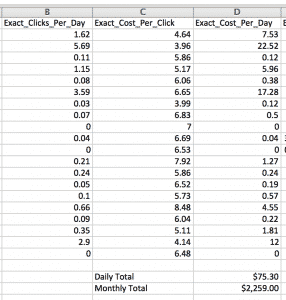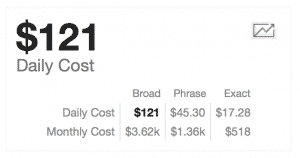How to Conduct Niche Research for an Affiliate Site
How do you an evaluate a potential affiliate niche? It's a question I'm asked several times a week. Half of the niches I've created affiliate sites in were ones I stumbled across totally by chance. The rest are in niches I directly set out to target.
But regardless of how you find a niche, there's a bit of research you need to conduct if you want to find out the revenue potential of a niche before you spend a lot of time and effort targeting it.
Show me the money
The first thing I want to know is if there's money in the industry, because if there isn't then the rest of these steps would be a waste of time. ;-) I'll do a quick check to be expanded on later if it passes the litmus test.
Check for the presence of PPC advertising
The first thing I'll do is head over to Google and run searches for some of the core terms in the niche. I'm looking to see how many PPC advertisers the terms bring up. If I don't see any PPC ads for the terms (or only a handful of them), it might be a warning flag.
Typically, if a term has monetary value, then you can count on advertisers to bid on it. The exceptions to this rule would be regarding terms that are 1. trademarked or 2. disallowed for advertising on via Google's Terms of Service.
Check for the presence of multiple affiliate programs
The last thing you want to do is build up traffic around a niche where products or services are only offered by one merchant.
A long time ago I built up an affiliate site centered around a specific service. About six months after I took top rankings in the niche, the merchant shut down its affiliate program. Since there were no other affiliate programs for it, the site became useless from a revenue standpoint.
Of course, this was pre-AdSense existing, but still, lesson learned. I won't enter a niche as an affiliate unless there are multiple options within it for generating revenue.
Assuming the niche passes the general money test, we'll move on to:
Show me the traffic
Next up is ensuring the niche gets enough traffic to generate any significant revenue in correlation to the effort required to enter it.
Get your keyword research on
I'll conduct niche keyword research to find every term in the industry with any traffic volume that I can. You can do that utilizing free tools like Bing's keyword tool or Wordstream or using a paid tool like Raven Tools or SEMRush.
There's not really a “hard number” in regards to keyword volume for a niche to be worth your while. A niche with 40,000 total searches a month could beat out one with 1,000,000 searches a month from a revenue perspective. It all comes down to the potential revenue you can generate from visitors (more on that below) AKA your return on investment (ROI).
Checking out the search trends
Is interest in the niche going up, steady or going down? Google trends is pretty decent for gaining insight in that respect. For example – below is a chart showing the interest in the term “BlackBerry” over the last nine years.
2007 would have been a great year to get into this niche (which I did). Had I come across this niche in 2012, I wouldn't have gotten into it, regardless of the static traffic numbers because it was on a steady decline.
You want to get involved with niches with an upward or steady trend – and avoid those that are showing a steady or significant decline.
Also be aware that any niche that surrounds a fad is at risk of later decline. An example would be Acai Berry which was a short-lived weight loss fad in 2008 and 2009.
Checking out the competitor trends
Sometimes a niche might be too small to get proper intel from Google trends. And even if I can, I always want to cross check that information. So I'll plug the top five competitors on the main term in the niche into a tool that checks their traffic trends. You can either use a free tool like Alexa or SEMRush (which is free for this type of research).
Again, I'm looking for gaining traffic or steady traffic. Declines would make me question the desire to enter the niche, especially considering the competitor ranks well on the core terms for the niche.
So now I know there is general money to be made and the traffic volume and trends for the niche look good.
Show me the competition
I market my sites via SEO, so my next research step is to identify who my primary competitors would be in the niche so I can get some insight into what “competing” in that industry in the organic search results is going to entail.
Check out WHO is ranking for the top keywords
All competitors are not created equal. Who ranks for the top ten for a search term can give you some insight into how hard it will be to crack.
If the entire top ten for the top 10 search terms for the niche are all big brands without an affiliate site or non-mainstream media blog to be seen, you may want to rethink the niche if you wouldn't consider your comprehension and execution of SEO to be “advanced level” in nature.
I'm not saying it's not possible to beat out big brands and mainstream media. I'm just saying it's a large mountain to climb. I like to see at least a few results that aren't a large brand or publication.
Check out WHAT is ranking for the top keywords
While you're checking out “who” is ranking, you should also be checking out “what” is ranking. Are all of the top ten results root level domains (meaning www.competitor-site.com) or are there some pages ranking within them (meaning www.competitor-site.com/individual-page/)?
If the top ten results for multiple terms are owned by root domains, that indicates to me that there is a higher level of competition for these terms. If I see a lot of pages ranking, then that indicates to me that the competition bar might not be as high.
Researching the backlinks of the competition
Providing the niche isn't owned by the root domains or big brands, then I'll take the top competition (the ones I continually see showing in the top ten for the various niche terms) and research their backlinks to see how much strength those results have.
Personally I run the domains through multiple research tools to do this. All the tools I use are paid (Raven Tools, Open Site Explorer and Link Research Tools).
However, Open Site Explorer will spit back basic overview information on competitor link profiles for free under the “compare link metrics” tab allowing you to compare up to five root domains or individual pages at once.
I just prefer also to be able to look through those links to see anchors, authority, etc. via the paid version (and the other paid tools above).
Evaluating all of the above
I'm looking to cross reference the above to get a level of the competition. If the top searches are owned by big brands, ranking with their root domains for the term and 100,000 backlinks a piece, I'll probably pass on the niche.
If the top searches are a mix of big brands, niche sites and blogs, root domains, pages and the top results have a few hundred backlinks a piece, then I'm now super interested in the niche.
Show me the angle
To have long-term success in the niche, you're going to have to be able to define a point of difference (POD) between you and every other site currently succeeding in the niche. If you enter this niche, how will you differentiate yourself?
In doing the research for the “show me the competition” section, you should have seen a lot of your would-be competitors. What's going to be your angle?
- What content are your potential competitors lacking? Can you fulfill that void?
- What features are your potential competitors missing? Can you create them?
- What is your potential competition doing well that you feel you could do better?
- Is there a missed demographic your potential competitors are failing to specifically target? (For example, there are a ton of recipe sites – but are any of the formidable competitors targeting working moms?)
- Are there any promotional avenues your competitors are ignoring that you could rock? (For example, are they ignoring Google+ in an industry where the demographic is active on Google+?)
- What voice is your competition using? Can you contribute a unique one?
Unless I can clearly define what my POD would be, it's going to be a tough road in regards to standing out from the niche. If I can find a clear POD and execute it, then my odds of success are a lot better.
Show me the potential
Now that I know general money exists within the niche, that the traffic volume and opportunity are there, that the SERPs are achievable and that I have an angle I can attack the niche from, my last question is “what is the ROI potential of being successful in this niche?”
Unfortunately, that question can't be answered definitively before entering said niche. But, you can make some educated guesses.
Estimating potential ranking values
In my last post, I discussed finding the money keywords for your affiliate marketing and SEO efforts. Whether you use that method of finding out the estimated CPC of the search terms within the potential niche or another method, you're going to need to compile that information to do this step.
Once I have the CPC of say the top 20 money keywords with the most traffic volume in the niche, I'll run a search on Spyfu to estimate the potential value of ranking on those terms (you can also get the CPC information via SpyFu, I just find SEMRush is much more user-friendly). I have a paid membership to SpyFu (you can read my full SpyFu review here) which allows me to run all the keywords at once via their “groupie” tool, but you can do it for free providing you enter it in keyword by keyword.
In the bulk export, the column that matters to me is “Exact_Cost_Per_Day” which is the amount that Google estimates you would spend, on average, to advertise on this keyword each day. I'll then add a function to give me a daily tally for those top 20 terms and a function to multiply that daily total by 30 to give me a total monthly value for those 20 niche keywords.
In the above case, the “estimated cost” of those terms – and thus the potential value of those terms to advertisers – is $2,259 per month.
In the free keyword by keyword search at SpyFu, you'd be looking for the “Monthly Cost” listed under the “Exact” column, which in the example below is $518.
Then you'll need to tally the monthly cost (for exact) for all 20 keywords combined to get to that same tally of $2,259.
Keep in mind the above is 1. only the tally for 20 money terms, 2. is based on top rankings for these keywords and 2. not “what you'll make.” Monetizing effectively is a whole different animal. :)
This is merely some educated insight into what the potential monetary value of ranking for the top money terms within the niche may be. Sometimes I run the top 30, 50 or 100 keywords as well (for example – running the top 50 keywords for the same niche above brought me back a monthly total of $8606.70).
But in this example, I kept it to 20 assuming many would choose the free option of doing it keyword by keyword. :)
You have to make the call
Once you've done all of the above, you should have a pretty complete picture of the niche as one can from the outside looking in. It will be up to you to make the call as to whether or not the niche is “doable” and worth your time, effort and money to enter it and truly compete.
Edited to add: Need some tips on how to find a niche to research? Check out this post on finding profitable affiliate niches.
Got any questions or tips to add? Drop em in the comments below.
12 Comments
Please note – I use affiliate links on this site. This means I might earn a commission if you click on a link and sign up for something.





Great stuff Rae. The “Show me the traffic” and “Show me the competition” parts were always the ones I slacked on. Usually I would just get an idea and start going to town on it without doing enough research into what other sites were ranking, what the trends were, etc.
If I were to take the time to do the research ahead of time I could have saved myself hundreds of dollars and many, many hours of time with projects that never took off. I would do some keyword research and have a good angle and do my research on those ends but too often I just discounted the competition or was arrogant enough to think I could beat them. That worked 10 years ago but not so much now.
Thanks Joe. Yeah, those were the days eh?! I think if you asked every affiliate that’s been an affiliate for more than eight or so years what their one regret was, it would be not building more sites back in the day (personally, I’d have gotten by on two hours of sleep a night in retrospect haha). ;-)
With the level of commitment required to make a site rank now, it’s really important to do as much research as possible to ensure it’s not a whole lot of energy wasted. :)
Another tool that might be helpful on the keyword side is TermExplorer (.com). I use to help get volume for a group of keywords at a time (up to 1k at a time) and also to do some really deep keyword yanking from multiple sources.
I have nada to do with that tool but have recommended it inside of SeoBook b/c I never had access to an AdWords API and post-keyword brainstorming it was always laborious to manually check volume and CPC. SemRush does a marvelous job of this but in those instances where you have a brainstormed list, TE can be helpful.
It also checks for the availability of an exact match domain, I believe just .net/com though.
Thanks for the tip Eric. I’ve never tried TermExplorer but just added it to my list of tools to check out for upcoming potential review posts. In my opinion, you can’t have too many keyword research tool options. ;-)
I’m a bit confused by the potential section – finding out how much your competitor(s) are willing to spend on your money keywords per month. That tells you how much a competitor is willing to spend on traffic each month for those keywords, correct? So they must be making more than that amount. Well we assume so. But that depends on what they’re selling, correct?
Just trying to wrap my head around how I am to interpret this data.
Thanks!
Hey Kim – correct on estimating how much folks advertising on those keywords are willing to spend to be seen on those keywords. Also correct, that in theory, they would be making more than that amount on whatever it is they’re selling. But keep in mind they’re usually the merchants, so they have higher margins on the keyword value than most affiliates would.
The potential section is merely to give you an indication of the value of a niche. :) Hope this helps!
To me one of the biggest issues I’ve kicked myself in the butt with in the past is spending enough time researching monetization. I’ve found niches with little competition in the SERPs, plenty of people bidding in PPC, and decent traffic. Then I build sites around them and started seeing success with traffic. The problem comes when the only affiliate program out there shuts down and AdSense is about the only way to monetize that traffic. I will rarely touch a niche now that I don’t see multiple merchants with affiliate programs and multiple products to fit the niche.
Excellent post Rae. Going to link to this post for sure. Thanks.
Logan – don’t feel bad, we’ve all done it haha. :) Thanks – glad you found it useful! :)
These days I also check out the interest volume for various countries in Facebook ads platform to see how viable the niche will be in social media. This gives you a good idea of the number of people interested in a particular topic or product.
Great point Jon – thanks for dropping it into the conversation! :)
Hi Rae, wow – what a great article. :-) I’m a newbie at all this… so really appreciate the insight into ‘how to find a great niche’. My concern is that I’m a little late to the party? I know that there are obviously some unmined territories and sub sub niches out there but do you think it’s the experienced affiliate guys who will find those niches?
Also, I’ve signed up to Wealthy Affiliate as a basic starting point and wondered what you thought about them whether it’s best to start out this way?
Many thanks
Hey Dan – I don’t believe that folks can’t still enter a niche today and find success within it. I might not advise a newbie enter the credit card niche where the competition is ridiculous, but 80% of the niches are still highly achievable for someone who puts in the time, sweat and effort. :)
Sorry, no experience with the program you asked about.